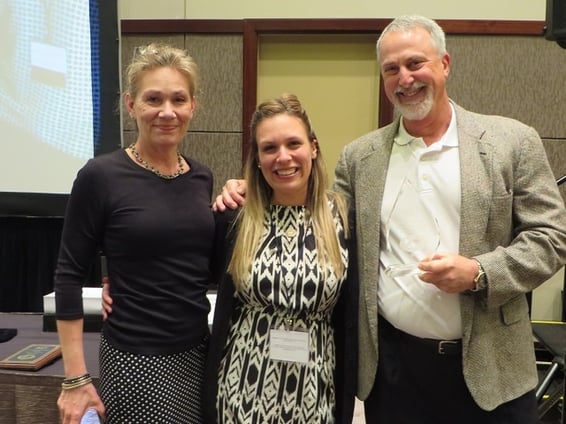Here's why a supervisor fell in love with the MST model
Remy Schonhaut wasn’t looking to join an MST program. Instead, it found her. And she’s more than glad it did.
She was working in a residential program when she saw an opening for a supervisor at a prevention program based Multisystemic Therapy (MST) called MST-CAN. “I quickly fell in love with the MST model and its unique approach of keeping children in their home with their families,” Remy said.

Remy, middle, with her mother (left) and Scott Henggeler (right) at the International Conference 2016
In short order, she experienced all the good that happens when children stay in their home and community. She saw how bonds are strengthened in the different systems in which MST works —the family, community, schools and extended family. “The magic happens in home, and it’s sustainable after we close a case because we teach caregivers new skills that they continue using after you’ve gone,” Remy explained.
Looking back at her time working in the residential program, she sees how beneficial it is to work in the child’s home and community to strengthen those systems. “They were away from their home, their parents and community. That created less of an opportunity to strengthen those systems and more fully impact changing the environment. Hence at times, you would see the same kids coming back.” Remy said.
MST-CAN: Working in the child-welfare system
Remy was hired by the Children’s Aid Society in New York City as the supervisor of their MST-CAN program. MST-CAN (Child Abuse and Neglect) is a prevention program for children referred because of parental or caregiver maltreatment. First and foremost, their job is to keep everyone in the family safe, while striving to keep the family together.
Working intensely in the home
Because MST-CAN is an evidence-based model, therapists track progress one week at a time. It is possible to quickly assess and measure whether the treatment steps are working. Assessment of safety and risk factors are done in the children’s environments. When a therapist is in the home two to three times a week, a clear picture of safety risks and barriers emerges.
One case that was particularly gratifying for Remy was a situation that involved a 10-year-old boy who hadn’t gone to school in more than 100 days. Mom has strong symptoms of PTSD from past domestic violence and assaults, and didn’t have the skills to create and maintain structure in the home. This caused an imbalance in the home where the child used physical and verbal aggression to get his way. This role reversal meant that his education and mental-health needs were neglected. Many days, the child was left to sit in his underwear, playing video games all day.
The team worked hard to address mom’s trauma symptoms and taught her daily relaxation techniques. They put a strong safety plan in place so she could begin to implement interventions to increase structure in the home. After a lot of practice and support, mom was able to get her son to his mental-health appointments and school regularly. With the new skills the mom acquired, she was able to stop being triggered by her son’s behavior and provide the structure and appropriate hierarchy in the home for success.
At the end of treatment, this family had met all its goals:
- Demonstrated school success. He was completing his assignments with passing grades.
- Developmentally appropriate structure in the home.
- The boy’s medical and mental needs were being addressed.
- Decreased association with negative peers and delinquent activity.
The most gratifying piece for Remy was mom’s reaction at the closing of the case. The mom was able to acknowledge all her own progress, all the changes she had accomplished that made it possible for her to effectively parent her child. This after she had spent much of time saying MST will never work.
Happily, MST-CAN does work, and Remy’s agency has a track record to prove it. Of the 39 families referred so far, 95 percent of the cases that completed treatment ended up with the children living at home, 95 percent of the youth were attending school when treatment ended, and 85 percent of the parents had no arrests since starting treatment.
Hearing the words “abuse and neglect” makes it easy to automatically perceive these parents in a negative light. But Remy views them as “some of best people and parents I’ve met. They are so resilient, and that’s pretty incredible.”
For her outstanding work as an MST-CAN supervisor, Remy Schonhaut was recently honored with a Whatever It Takes (WIT) award.


